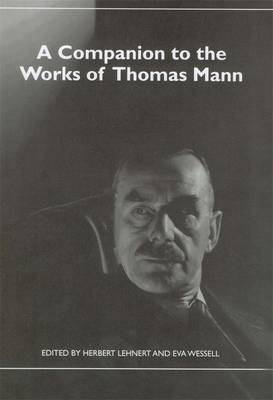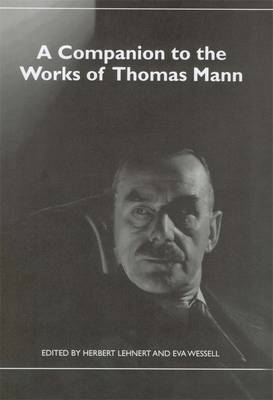
Door een staking bij bpost kan je online bestelling op dit moment iets langer onderweg zijn dan voorzien. Dringend iets nodig? Onze winkels ontvangen jou met open armen!
- Afhalen na 1 uur in een winkel met voorraad
- Gratis thuislevering in België vanaf € 30
- Ruim aanbod met 7 miljoen producten
Door een staking bij bpost kan je online bestelling op dit moment iets langer onderweg zijn dan voorzien. Dringend iets nodig? Onze winkels ontvangen jou met open armen!
- Afhalen na 1 uur in een winkel met voorraad
- Gratis thuislevering in België vanaf € 30
- Ruim aanbod met 7 miljoen producten
Zoeken
A Companion to the Works of Thomas Mann
€ 64,45
+ 128 punten
Omschrijving
Sixteen new, carefully focused essays on the prose works of one of the great writers of modernity. Thomas Mann is among the greatest of German prose writers, and was the first German novelist to reach a wide English-speaking readership since Goethe. Novels such as Buddenbrooks, The Magic Mountain, and Doktor Faustus attest to his mastery of subtle, distanced irony, while novellas such as Death in Venice reveal him at the height of his mastery of language. In addition to fresh insights about these best-known works of Mann, this volume treats less-often-discussed works such as Joseph and His Brothers, Lotte in Weimar, and Felix Krull, as well as his political writings and essays. Mann himself was a paradox: his role as family-father was both refuge and façade; his love of Germany was matched by his contempt for its having embraced Hitler. While in exile during the Nazi period, he functioned as the prime representative of the "good" Germany in the fight against fascism, and he has often been remembered this way in English-speaking lands. But a new view of Mann is emerging half a century after his death: a view of him as one of the great writers of a modernity understood as extending into our 21st century. This volume provides sixteen essays by American and European specialists. They demonstrate the relevance of his writings for our time, making particular use of the biographical material that is now available. Contributors: Ehrhard Bahr, Manfred Dierks, Werner Frizen, Clayton Koelb, Helmut Koopmann, Wolfgang Lederer, Hannelore Mundt, Peter Pütz, Jens Rieckmann, Hans Joachim Sandberg, Egon Schwarz, and Hans Vaget. Herbert Lehnert is Research Professor, and Eva Wessell is Lecturer in Humanities, both at the University of California, Irvine.
Specificaties
Betrokkenen
- Uitgeverij:
Inhoud
- Aantal bladzijden:
- 363
- Taal:
- Engels
- Reeks:
- Reeksnummer:
- nr. 34
Eigenschappen
- Productcode (EAN):
- 9781571134059
- Verschijningsdatum:
- 1/05/2009
- Uitvoering:
- Paperback
- Formaat:
- Trade paperback (VS)
- Afmetingen:
- 152 mm x 229 mm
- Gewicht:
- 539 g

Alleen bij Standaard Boekhandel
+ 128 punten op je klantenkaart van Standaard Boekhandel
Beoordelingen
We publiceren alleen reviews die voldoen aan de voorwaarden voor reviews. Bekijk onze voorwaarden voor reviews.










